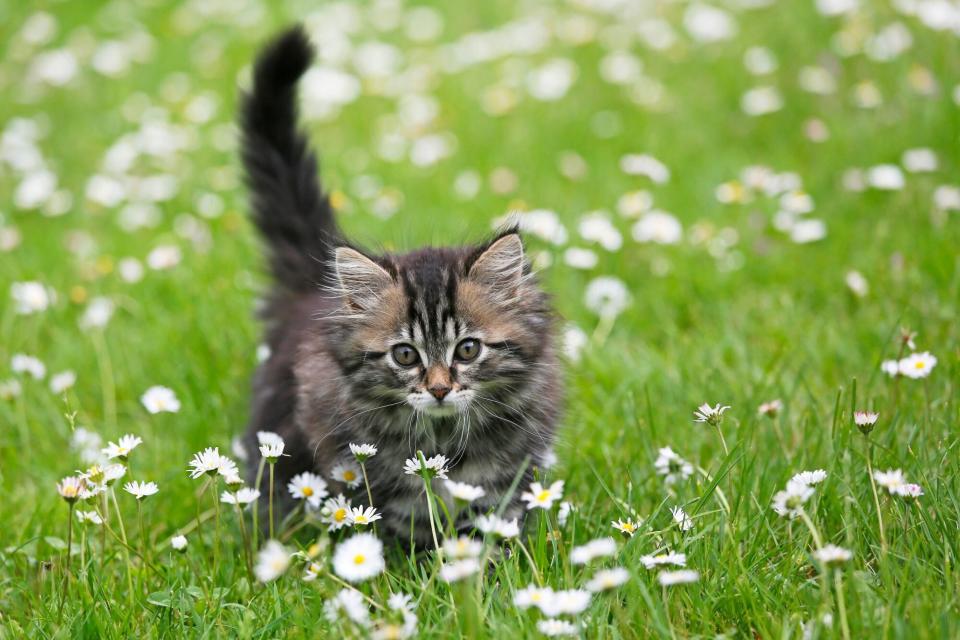Can Cats Eat Daisies?
Left to their own devices, most cats will gladly explore things they shouldn't. Whether that's scraps from the dinner table or the flowers you brought home from the farmer's market, it's important to monitor your cat to make sure their curiosity isn't getting the best of them and causing serious medical problems. This is especially true if your cat spends time both indoors and outdoors and might find themselves in close proximity to plants that look like a tempting snack.
How Do You Know Which Plants Are Safe for Your Cat?
Dr. Lauren Cline, DVM, of Queen City Animal Hospital says that any plant has the potential to trigger some gastrointestinal issues, like vomiting or diarrhea, if your cat ingests it. With that said, Dr. Cline notes that some plants are more toxic than others and should be avoided due to the risk of organ failure or other serious illness.
Not sure how to tell if the plants in your home or in your backyard pose a risk for your four-legged friends?
"I recommend that all owners be aware of what plants they have in the home and in their yard and look each one up on the ASPCA list of toxic plants. This comprehensive list will detail toxic principles and clinical signs to monitor for, as well as let you know if emergency treatment needs to be sought in the event of exposure or ingestion," Dr. Cline says.
Though they're beautiful, cat owners should steer clear of lilies, Dr. Cline says.
"Both true lilies- Lilium sp. and Hemerocallis sp., can cause acute and fatal renal failure in cats," she says. "Even licking the pollen off these plants can be detrimental, so I recommend avoiding having them in the home completely if you own a cat. These include Asiatic lilies, East lilies, daylilies, peace lilies, and Lily of the Valley."
Sago palms can also pose a risk to both cats and dogs, Dr. Cline says. If ingested, these plants can cause serious gastrointestinal issues, followed by seizures and liver failure. Other plants that pet owners should consider avoiding include oleander, azaleas, foxglove, and lantana.
While the kinds of plants you've got growing in your yard will probably vary depending on where you live and your own personal preferences, many of us will find that we've got daisies in our yards. Can cats eat daisies without serious health issues?
Daisies aren't as toxic to cats as some of the plants listed above, Dr. Cline says, but these flowers can still trigger gastrointestinal issues, like vomiting, diarrhea, and hypersalivation. This applies to dogs, too. For this reason, it's best to encourage all pets to avoid eating daisies whenever possible.

Getty/Christophe LEHENAFF
What Should You Do if Your Pet Ingests a Poisonous Plant?
If your pet has ingested a toxic plant, Dr. Cline recommends immediately calling the ASPCA Poison Control Helpline at 888-426-4435. The team will do a consultation with you to determine the most appropriate next steps, including if you need to take your pet to a local animal hospital.
What Can You Do To Prevent Your Pet from Ingesting Toxic Plants?
First and foremost, be aware of what's growing in your yard. Secondly, Dr. Cline advises always keeping a close eye on your pets when they're outside. Whenever possible, keep any toxic plants away from your home's interior and exterior.
If you've got plants that may cause a problem for your pets, consider installing fencing or an enclosure to prevent your animals from having access to these plants. While the various greenery and flowers you've got both inside and outside your home may look tempting to your pets, it's important to prevent them from eating something that could trigger serious health issues.
